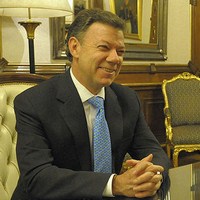One year ago, Colombian President Juan Manuel Santos made the riskiest move of his presidency. He agreed to enter peace talks with the Revolutionary Armed Forces of Colombia (FARC), the Marxist guerrilla organization that has kept the country at war for half a century in a conflict that has taken the lives of more than 200,000 Colombians. If the talks succeed, Santos will earn a place in history, the undying gratitude of the Colombian people and a second term as president. If they fail, the talks could provide the epitaph to his political career.
Today, the negotiations with representatives of the FARC continue in Havana, with only the vaguest hints of progress. With the end of Santos’ presidential term approaching, the calendar is moving inexorably toward the critical moment; the closer the election, the greater the pressure to reach a deal.
As the clock runs down to the May 2014 presidential election, the prospect of peace hangs in the balance for the country. Colombians are getting restless, taking a decidedly unfavorable view of the president and becoming increasingly suspicious of the secretive process.

